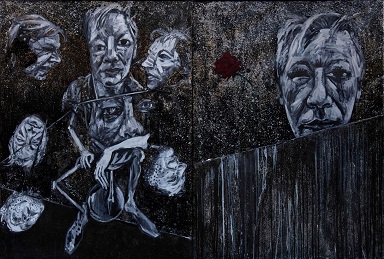Assange: A Threat to War Itself
Robert C. Koehler

George Gittoes’s second painting of Julian Assange, painted on the roof
at the Yellow House art center in Jalalabad, Afghanistan. (Artnet News)
The Pentagon’s offer of “condolence money” to the relatives of the ten people (seven of them children) who were killed in the final U.S. drone strike in Afghanistan — originally declared righteous and necessary — bears a troubling connection to the government’s ongoing efforts to get its hands on WikiLeaks founder Julian Assange and punish him for exposing the inconvenient truth of war.
You know, the “classified” stuff — like Apache helicopter crewmen laughing after they killed a bunch of men on a street in Baghdad in 2007 (“Oh yeah, look at those dead bastards”) and then smirked some more after killing the ones who started picking up the bodies, in the process also injuring several children who were in the van they just blasted. This is not stuff the American public needs to know about!
At the time of the release of that particular video, in 2010, then-Secretary of Defense Robert Gates decried the fact that the public was seeing a fragment of the war on terror “out of context.” And, indeed, he was right. As I later wrote:
“The Department of Defense is supposed to have total control over context; on the home front, war is 100 percent public relations. The public’s role is to be spectators, consumers of orchestrated news; they can watch smart bombs dropped from on high and be told that this is protecting them from terrorism and spreading democracy. That’s context.”
Assange’s crime was collaborating with whistleblowers to expose hidden data and disrupt that context. Over the course of a decade, WikiLeaks published some 10 million secret documents, more than the rest of the world’s media combined, according to a Progressive International video. This is the organization that has launched the Belmarsh Tribunal, which is demanding that Assange be released from British prison and not be extradited to the United States. The Tribunal, modeled after the 1966 tribunal organized by Bertrand Russell and Jean-Paul Sartre to hold the U.S. accountable for its actions in Vietnam, will put the country on trial for its 21st century war crimes.
























